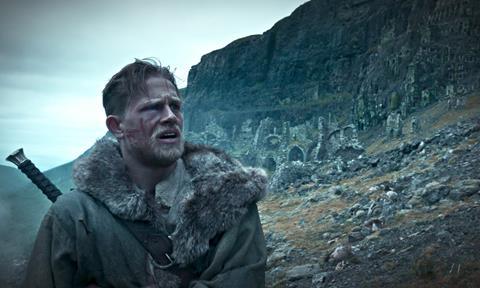The real stars of King Arthur are its technical team, as Guy Ritchie amps the action up to dizzying heights

Dir: Guy Ritchie. US. 2017. 126mins
Guy Ritchie trains his maniacally excessive eye on Camelot in King Arthur: Legend Of The Sword, a brawny, leaden action spectacle which is enlivened by the occasionally winning overabundance. The filmmaker behind the Sherlock Holmes reboot gives us brooding, badass heroes and glowering villains in this tale of a vengeful Arthur out to reclaim his rightful place on the throne. But the hypnotic sweep of the larger-than-life set pieces proves a mere distraction from a story that’s been stripped of its mythic qualities so it can be more easily processed through the blockbuster assembly line.
Commercial considerations strangle the vitality from the movie, but Ritchie does his best to bring a bit of impish wit to the proceedings
Opening May 12 in the States and a week later in the UK, this Warner Bros. release will rely on Ritchie’s relative cachet with audiences. Charlie Hunnam and Jude Law add a little commercial appeal, but mixed reviews and mild buzz may keep this Sword from slicing through any box-office records.
Set in medieval England, the film stars Hunnam as Arthur, a street orphan who will gradually learn that his father Uther (Eric Bana) was once king — that is, until Arthur’s conniving uncle Vortigern (Law) staged a coup, murdering Uther just as the boy was safely spirited away. Now a young man, Arthur proves his lineage by pulling the fabled sword Excalibur from its stone, an event that attracts the attention of Vortigern, who wants the kingdom’s rightful ruler killed.
Legend Of The Sword takes liberties with the familiar tale, placing magical Merlin on the sidelines and emphasising the battle for the crown waged between Arthur and Vortigern. But the most obvious alteration is that Ritchie has envisioned this legend through the prism of other recent blockbusters. Elements of Gladiator and the Harry Potter franchise are apparent, but more broadly, Legend Of The Sword slavishly adheres to the tenets of modern tentpole filmmaking, which require a gaudy slathering of CGI and a tendency to present an iconic character through a dark origin story that, the studio hopes, will lead to multiple sequels.
Commercial considerations strangle the vitality from the movie, but Ritchie does his best to bring a bit of impish wit to the proceedings. The screenplay, which he co-wrote, mostly falters when it aims for clever quips and comic relief, but Legend Of The Sword boasts a giddy boisterousness whenever the director lets fly with his hyperbolic action sequences. Not unlike his big-screen redo of The Man From U.N.C.L.E., Ritchie’s new movie works best when it’s forgoing story altogether, instead just letting the sensuous rush of kinetic images wash over the viewer. As Arthur and his henchmen race through crowded streets while fighting Vortigern’s thugs — or when Arthur finally squares off with his uncle in a pyrotechnic-laden final duel — Legend Of The Sword displays a creative spark that’s otherwise missing.
After revealing quiet depths in The Lost City Of Z, Hunnam comes across as wooden here, focusing on Arthur’s manly, smart-ass posturing at the expense of much nuance or charisma. In this regard, he’s well-matched with the equally one-dimensional Law, who played Watson in Ritchie’s Sherlock Holmes films and in Legend Of The Sword hams it up as the haughty, fiendish Vortigern, letting his eyeliner do most of the emoting.
The supporting cast is even drearier, most of them constricted by the film’s glum solemnity. Àstrid Bergès-Frisbey gives dire line readings as a magical creature trying to help Arthur, and Djimon Hounsou delivers another of his noble-warrior roles. However, Game Of Thrones veteran Aidan Gillen acquits himself as a fearsome archer, his dignified demeanour suggesting a character even though one hasn’t been written for him.
The film’s real stars are its technical team — particularly, editor James Herbert and John Mathieson, who give Legend Of The Sword a dynamic, contemporary sheen despite the grubby period setting. Composer Daniel Pemberton complements Ritchie’s knowing visual excess, crafting a pounding, grandiose score that, on occasion, is literally breathless. During certain high-intensity moments, Pemberton supplements the percussive instruments with his own heavy, syncopated breathing. Like the movie itself, the technique is ridiculously exaggerated but moderately diverting — until, in typical Ritchie fashion, it wears out its welcome through overuse.
Production companies: Village Roadshow Pictures, RatPac-Dune Entertainment, Weed Road, Safehouse Pictures, Ritchie/Wigram Productions
Worldwide distribution: Warner Bros. Pictures, www.warnerbros.com
Producers: Akiva Goldsman, Joby Harold, Tory Tunnell, Steve Clark-Hall, Guy Ritchie, Lionel Wigram
Executive producers: Steven Mnuchin, David Dobkin, Bruce Berman
Screenplay: Joby Harold and Guy Ritchie & Lionel Wigram, story by David Dobkin and Joby Harold
Cinematography: John Mathieson
Production design: Gemma Jackson
Editor: James Herbert
Music: Daniel Pemberton
Website: www.kingarthurmovie.com
Main Cast: Charlie Hunnam, Àstrid Bergès-Frisbey, Djimon Hounsou, Aidan Gillen, Jude Law, Eric Bana
























